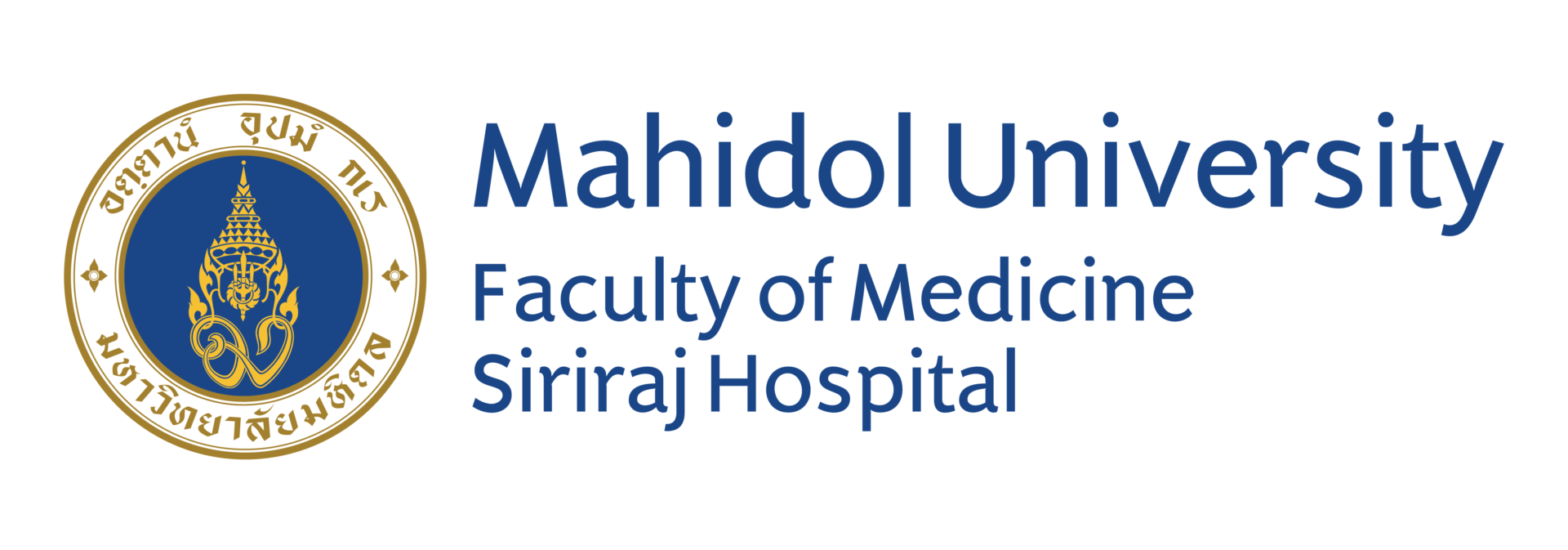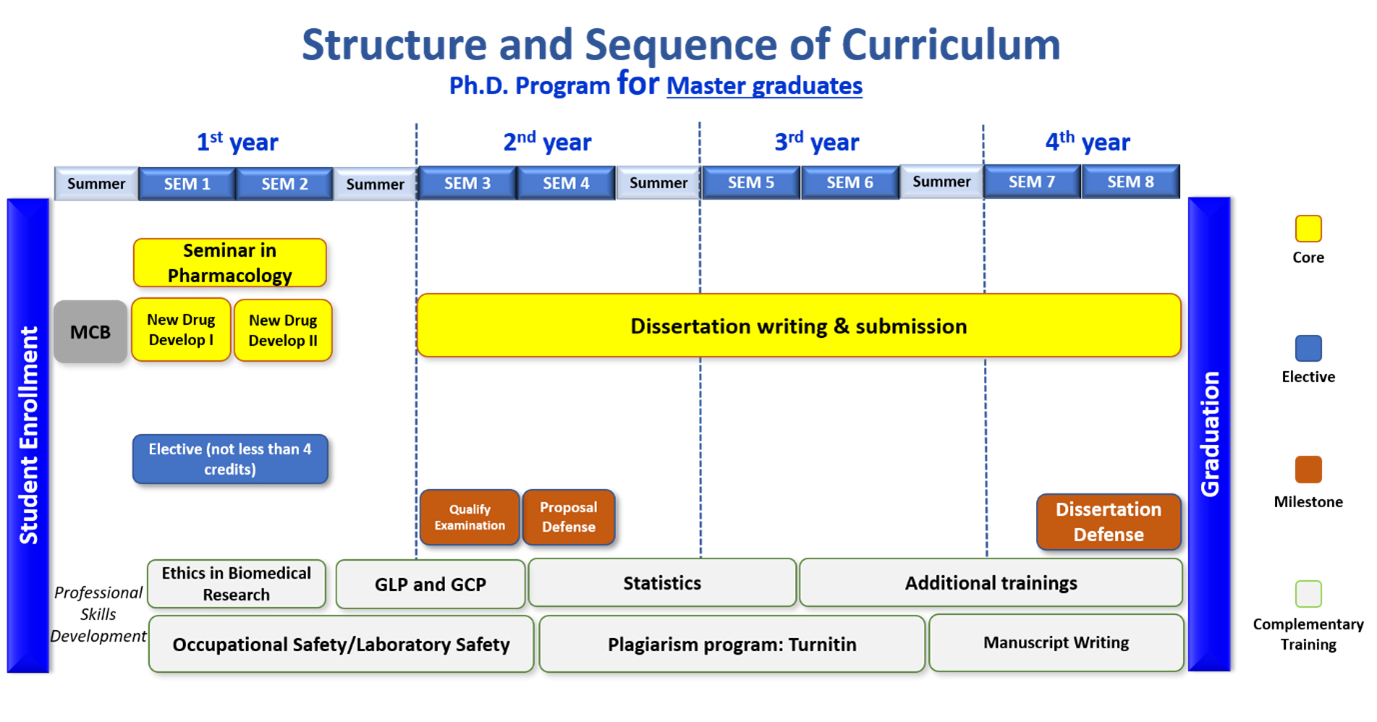Curriculum Structure
| 1) Required courses | 8 | credits |
| 2) Elective courses not less than | 4 | credits |
| 3) Thesis | 36 | credits |
Total not less than 48 Credits
Master to Ph.D.
| CODE | SUBJECT | CREDIT(S) | LECTURE(H) | LAB(H) |
| Required Course | ||||
| SIPM 603 | Seminar in Pharmacology and New Drug Development | 3 | 45 | – |
| SIPM 604 | New Drug Development II | 3 | 45 | – |
| SIPM 607 | Seminar in Drug Discovery and Development | 2 | 30 | – |
| Elective Course (not less than 4 credits) | ||||
| SIPM 514 | Fundamentals of Medical Pharmacology | 3 | 45 | – |
| SIPM 515 | Medical Pharmacology and Therapeutics | 3 | 45 | – |
| SIPM 516 | Fundamental Principles in Systems Pharmacology | 3 | 45 | – |
| SIPM 517 | Advanced Quantitative Techniques in Systems Pharmacology | 3 | 45 | – |
| SIPM 608 | Frontier Research in Redox and Bioenergetic Pharmacology | 1 | 15 | – |
| SIPM 609 | Precision Oncology Concepts from Real-World Case Studies | 3 | 45 | – |
| SIPM 610 | Laboratory in Systems Pharmacology I | 2 | – | 60 |
| SIPM 611 | Laboratory in Systems Pharmacology II | 2 | – | 60 |
| SIPM 613 | Frontier Experimental Methodology in Pharmacology and New Drug Development | 3 | 30 | 30 |
| MTID 617 | Bioinformatics | 2 | 15 | 30 |
| SIBS 512 | Precision Medicine | 2 | 15 | 30 |
| SIIM 617 | Advanced Flow Cytometry | 2 | 30 | – |
| Thesis | ||||
| SIPM 699 | Dissertation | 36 | – | 108 |
| SIPM 898 | Dissertation | 48 | – | 144 |
Required Courses
| CODE | SUBJECT | CREDITS | LECTURE(h) | LAB(h) |
|---|---|---|---|---|
| SIPM 603 | New Drug Development I | 3 | 45 | – |
Course Description:
Review principles and research methodologies of the complete new drug discovery and development in preclinical studies including in-depth pharmacological research in both in vitro and in vivo studies; modeling design; ethical consideration, and international regulations
Learning Outcome(s) : –
| CODE | SUBJECT | CREDITS | LECTURE(h) | LAB(h) |
|---|---|---|---|---|
| SIPM 513 | New Drug Development II | 3 | 45 | – |
Course Description:
All essential principles of clinical drug development: applied clinical pharmacology for first-in-human and early phase trials; study designs of clinical trial phase I, II, and III; ethical and international regulations for new drug approval; post-marketing studies including pharmacoepidemiology, pharmacoeconomics, and drug cycle.
Learning Outcome(s) : –
| CODE | SUBJECT | CREDITS | LECTURE(h) | LAB(h) |
|---|---|---|---|---|
| SIPM 607 | Seminar in Drug Discovery and Development | 2 | 30 | – |
Course Description:
Advancement of various aspects of biopharmaceutical research and industry: gene editing technologies (such as CRISPR/Cas9), growth in immuno–oncology, targeting ribonucleic acid (RNA); an increasing focus on human microbiome; growing excitement about artificial intelligence (AI) for drug discovery/development; novel antibiotics for the threat of bacterial resistance; a controversial rapid growth of medical cannabis.
Learning Outcome(s) : –
Elective Course (not less than 4 credits)
| CODE | SUBJECT | CREDITS | LECTURE(h) | LAB(h) |
|---|---|---|---|---|
| SIPM 514 | Frontier Research in Medical Pharmacology | 3 | 45 | – |
Course Description:
Basic pharmacology, toxicology, biostatistics, and pharmacogenomics; regulatory science, the process of the preclinical and clinical drug development.
Learning Outcome(s) : –
| CODE | SUBJECT | CREDITS | LECTURE(h) | LAB(h) |
|---|---|---|---|---|
| SIPM 515 | Medical Pharmacology and Therapeutics | 3 | 45 | – |
Course Description:
Mechanisms of drugs interacting with systems of the human body; the components of molecule, enzyme, and pathway involving each system in the human body; the identified possible targets of diseases for the current treatment and the future treatment.
Learning Outcome(s) : –
| CODE | SUBJECT | CREDITS | LECTURE(h) | LAB(h) |
|---|---|---|---|---|
| SIPM 516 | Fundamental Principles in Systems Pharmacology | 3 | 45 | – |
Course Description:
The system-level reasoning of complex biological processes; advanced omics techniques for the system pharmacology research; basic handling of big data from omic measurement; computational concepts in the biomolecular dynamics, signaling cascades, feedback regulations and biological noises.
Learning Outcome(s) : –
| CODE | SUBJECT | CREDITS | LECTURE(h) | LAB(h) |
|---|---|---|---|---|
| SIPM 517 | Advanced Quantitative Techniques in Systems Pharmacology | 3 | 45 | – |
Course Description:
Hands-on skills on data normalization and preprocessing; advanced computational principles for analyzing and visualizing complex high-throughput omics data from genomics, transcriptomics, and antibody-based proteomics; the dimensional reduction; network analysis; data clustering; analysis and management of clinical data.
Learning Outcome(s) : –
| CODE | SUBJECT | CREDITS | LECTURE(h) | LAB(h) |
|---|---|---|---|---|
| SIPM 608 | Frontier Research in Redox and Bioenergetic Pharmacology | 1 | 15 | – |
Course Description:
Free radicals and reactive oxygen species (ROS) production; antioxidant defense systems; redox signaling pathway mechanisms; oxidative stresses and their effects in aging, cancer, metabolic diseases and other pathological conditions; ATP production mechanisms of the cell; mitochondrial dysfunctions in diseases; current advanced researches and therapeutic applications in redox and bioenergetic pharmacology.
Learning Outcome(s) : –
| CODE | SUBJECT | CREDITS | LECTURE(h) | LAB(h) |
|---|---|---|---|---|
| SIPM 609 | Precision Oncology Concepts from Real-World Case Studies | 3 | 45 | – |
Course Description:
Oncogene addiction; Synthetic lethality; Intra–tumor heterogeneity; Immune checkpoint blockade; Neoantigen prediction and cancer vaccine; Acquired vulnerability; Genetic and non–genetic resistance mechanisms; Molecular–based and tumor–agnostic biomarkers; Pan–omic subgrouping approaches; Cancer immunotherapy biomarkers; Umbrella and basket trials; Genomic tumor board.
Learning Outcome(s) : –
| CODE | SUBJECT | CREDITS | LECTURE(h) | LAB(h) |
|---|---|---|---|---|
| SIPM 610 | Laboratory in Systems Pharmacology I | 2 | 15 | 30 |
Course Description:
MATLAB, Tellurium and R languages: implement functions, solve ordinary differential equations, build tellurium-based dynamical models, and develop regression models.
Learning Outcome(s) :
At the end of the course students will be able to
1. Explain the principles of computing tools in Matlab, tellurium and R languages, creating basic differential equation solving functions, dynamic modeling with Tellurium and model development regression for the study of the relationship of variables for research in systemic pharmacology and can apply the knowledge gained to solve problems
2. Processes basic large-scale omics data, using Matlab, Tellurium, and R languages, we create basic differential equation solving functions. dynamic modeling with Tellurium and model development regression for the study of the relationship of variables for research in systemic pharmacology
3. Plan and design a pharmacological study based on knowledge, methods and research processes for new drug development. at the level of basic pharmacology both at the laboratory level and in the use of laboratory animals Design, modeling, ethical considerations and benchmarks
4. Demonstration of tool selection in pharmacological calculations communication and information technology appropriately
| CODE | SUBJECT | CREDITS | LECTURE(h) | LAB(h) |
|---|---|---|---|---|
| SIPM 611 | Laboratory in Systems Pharmacology II | 2 | 15 | 30 |
Course Description:
R and Python languages: pre-process large dataset, visualize big data, process different omic databases, Implement quantitative image processing, machine-learning tools for data mining.
Learning Outcome(s) : –
| CODE | SUBJECT | CREDITS | LECTURE(h) | LAB(h) |
|---|---|---|---|---|
| SIPM 613 | Frontier Experimental Methodology in Pharmacology and New Drug Development | 3 | 30 | 30 |
Course Description:
Application of updated research methodology in pharmacology and new drug development; transcriptome and proteome profiling technologies; updated techniques for active principle analysis; updated techniques for protein and nucleic acid analysis; updated techniques in metabolomics and pharmacokinetics; updated imaging techniques in pharmacology; updated techniques for genetic perturbation; the updated animal research in pharmacology and new drug development.
Learning Outcome(s) : –
| CODE | SUBJECT | CREDITS | LECTURE(h) | LAB(h) |
|---|---|---|---|---|
| SIPM 613 | Bioinformatics | 2 | 15 | 30 |
Course Description:
Data, database, bioinformatic tools; application for genetic materials analysis, proteins, biomolecules, and chemicals.
Learning Outcome(s) : –
| CODE | SUBJECT | CREDITS | LECTURE(h) | LAB(h) |
|---|---|---|---|---|
| SIBS 512 | Precision Medicine | 2 | 15 | 30 |
Course Description:
Concepts of precision medicine, stratifying patients using next-generation sequencing data and clinical data, applying other ‘omic’ methodology to complement genomic blind plots for identifying new diagnostic and prognostic markers, case studies in tumor profiling, using blood-based gene expression profiles in cancer prognosis, building and visualizing omic data, issues on patient privacy, ethical challenges in precision medicine.
Learning Outcome(s) : –
| CODE | SUBJECT | CREDITS | LECTURE(h) | LAB(h) |
|---|---|---|---|---|
| SIIM 617 | Advanced Flow Cytometry | 2 | 30 | – |
Course Description:
Introduction to advanced flow cytometry; flow cytometric operation; high dimensional data analysis; flow cytometric experimental design; advanced flow cytometry techniques for research; quality control in flow cytometry; flow cytometric data presentation; specific cell subset isolation by flow cytometric-based cell sorting; recent advance in flow cytometry.
Learning Outcome(s) : –
Thesis
SIMP699: Dissertation 36(0-108-0)
| CODE | SUBJECT | CREDITS | LECTURE(h) | LAB(h) |
|---|---|---|---|---|
| SIPM 699 | Dissertation36 | – | 108 |
In-depth research in novel knowledge which benefits pharmacology and is research ethical, thesis writing, research article writing and publication, ethics in research publication.
SIMP898: Thesis 48(0-144-0)
| CODE | SUBJECT | CREDITS | LECTURE(h) | LAB(h) |
|---|---|---|---|---|
| SIPM 898 | Thesis | 48 | – | 144 |
In-depth research in novel knowledge which benefits pharmacology and is research ethical, thesis writing, research article writing and publication, ethics in research publication.

